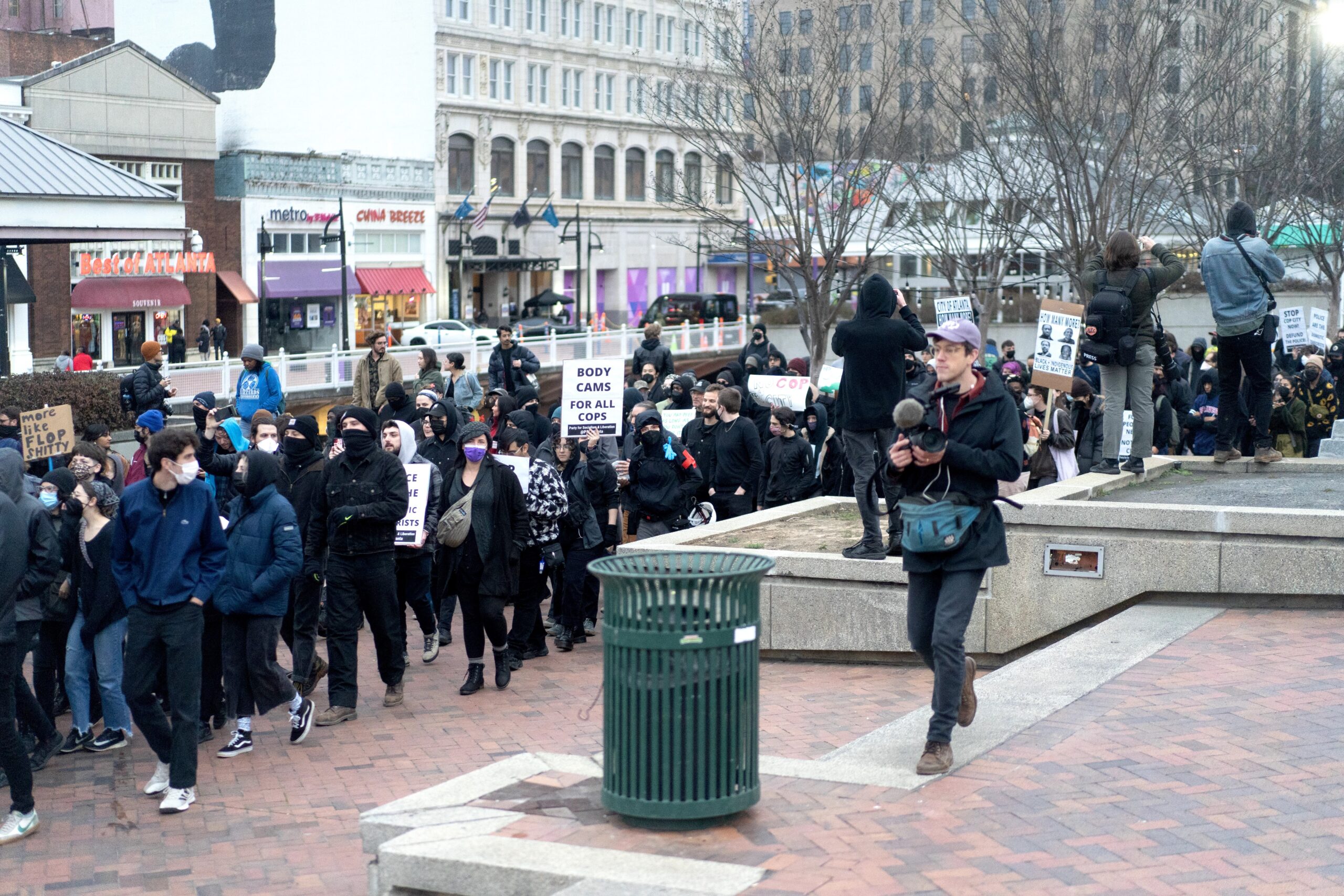The indictment of the alleged assassin comes as some states expand terror laws to ensnare protesters who block “critical infrastructure,”

Luigi by RCF-urlan. (Deviant Art, Creative Commons Attribution-NonCommercial-No Derivatives Works 3.0 License)
ByTruthout
 Manhattan District Attorney Alvin Bragg unveiled new charges on Dec. 17 against Luigi Mangione, the 26-year-old suspected of killing UnitedHealthcare CEO Brian Thompson.
Manhattan District Attorney Alvin Bragg unveiled new charges on Dec. 17 against Luigi Mangione, the 26-year-old suspected of killing UnitedHealthcare CEO Brian Thompson.
While Mangione already faced second-degree murder and weapons charges, the unsealed indictment reveals an escalation: New York prosecutors have charged Mangione with first-degree murder “in furtherance of terrorism.”
Bragg’s choice to invoke the big “T” word came as a surprise; it’s not often associated with a single, targeted killing. In fact, prosecutors are charging Mangione using a state law hatched after the 9/11 attacks “to combat the evils of terrorism.”
Tacking terrorism onto the indictment allows the district attorney to upgrade the murder charges from the second to the first degree; under New York law, first-degree murder charges are normally reserved for crimes like serial or mass killings or the murder of police officers.
In previous cases, Manhattan prosecutors have used the state domestic terror law to convict people accused of plotting to bomb synagogues or recruiting support for ISIS.
In 2019, a white supremacist pled guilty to New York terrorism charges after he killed a Black man with a sword with the intent of starting a “worldwide race war.”
Bragg said he levied the charge against Mangione because his alleged killing of the UnitedHealthcare CEO was intended “to sow terror.”
Folk Hero Status
It’s hard not to see the bloated charges in the context of Mangione’s recent ascent to quasi-folk hero status.
At the scene of Thompson’s murder, police reportedly found shell casings with the words “deny,” “defend” and “depose” — an apparent reference to a book about why health insurance companies deny claims. The suspect was also said to have left a backpack full of Monopoly money in Central Park.
This assemblage of facts meant that broad swaths of the internet across the political spectrum erupted in praise for Mangione, who many saw as a crusader against the for-profit health care system. People shared harrowing stories about their own struggles to obtain coverage for life-saving care.
As the public face of the largest health insurance company in the U.S., Thompson was flattened to a symbol of corporate greed. His total compensation in 2023 exceeded $10 million.
This outpouring of public resentment has unnerved health care executives. Corporations scrambled to scrub information about their C-suites from the internet and called up private security details. Bragg made a broad reference to this fear in a press conference.
“This was a killing that was intended to evoke terror and we’ve seen that reaction,” he told reporters on Dec. 17. “This was not an ordinary killing.”

Bragg in June 2023. (CmdrDan, Wikimedia Commons, CC BY-SA 4.0)
The word terrorist has never been a neutral descriptor in the U.S., applied equally across populations. In the aftermath of 9/11 and the U.S. invasion of Iraq, terrorism was recast by U.S. politicians and media as predominantly an issue of transnational, Islamist fundamentalism.
This imbued the term with a political charge that often obfuscated sources of mass violence at home — like white supremacy.
‘Legitimate’ State Violence
Labor journalist Hamilton Nolan has critiqued the terrorist label on his Substack, writing that, for years, it has been “embedded into the average American’s psyche as a synonym for ‘evil.’”
“It defines its subject from the outset as a villain,” Nolan wrote. “It connotes violence that is illegitimate, in contrast to the legitimate violence delivered by the state.”
Legitimate violence delivered by the state could, for instance, include systematic torture at Guantánamo Bay, the bankrolling of Israel’s genocide in Gaza or allowing a profit-driven health care system to kill thousands of U.S. citizens each year.
I should emphasize here that I’m not, of course, condoning any form of violence, but rather thinking critically through the instances in which state actors do or do not choose to call upon the terrorist label.
And in recent years, there have been several high-profile cases in which we’ve seen the police state’s definition of domestic terrorism expanding, even when no physical harm is involved.
Please Support CN’s
Winter Fund Drive!![]()
In Georgia, more than 40 activists have been charged under the state’s domestic terrorism law for their alleged involvement in the decentralized Defend the Atlanta Forest movement. Police warrants cited probable cause for the protesters’ arrest on grounds as weak as having muddy shoes.
Since late 2021, demonstrators have been pushing to stop the construction of a massive police training facility, dubbed Cop City, on Atlanta forest land.
[See: ‘Cop City’ Leads US Buildup in Police-Training Bases]
“If I am arrested with domestic terrorism charges for camping in a forest, that’s something I’m willing to go to court for,” Sam Law, an anthropology doctoral student from Texas, told the Associated Press in March of last year.
Georgia broadened its domestic terrorism statute in 2017, two years after white supremacist Dylann Roof perpetrated a mass shooting at a Black church in South Carolina. Lawmakers framed the revised law as a response to white supremacist violence, but the new language also included attacks on critical infrastructure and government facilities under the domestic terror umbrella.
The expanded definition has since been used to charge the Cop City protesters. According to prosecutors, blocking the construction of a police training facility now amounts to terrorism.

January 2023 protest in Atlanta against the construction of “Cop City,” a large police training center. (Tatsoi, Wikimedia Commons, CC BY-SA 4.0)
Several other states have proposed or enacted laws expanding their domestic terrorism definitions. When Democratic lawmakers introduced a bill in Oregon last year, civil liberties groups sounded the alarm.
Democrats said the expanded statute was a response to recent attacks on the power grid linked to neo-Nazi groups, but legal experts noted that the law was broad enough to sweep up anti-racist and climate activists for peaceful protests.
In February, New York Democrats introduced their own bill that would criminalize blocking public roads and bridges as an act of domestic terror — a further expansion of the already broad domestic terror law under which Mangione is being charged.
The move appeared to be in direct response to the influx of protesters swarming New York streets to call for a ceasefire in Gaza.
Disparate Acts
A brazen assassination, a mass shooting and a peaceful protest are obviously wholly disparate acts — and so their conflation under the banner of terrorism, a charge that already has a tradition of being wielded politically, should raise additional red flags.
On the day of Mangione’s arrest, another 26-year-old in New York was acquitted. A jury found Daniel Penny not guilty of criminally negligent homicide in the case over the death of Jordan Neely, a Black unhoused man experiencing a mental health crisis on the city subway. Video captured Penny maintaining a chokehold on Neely for nearly a minute after he had gone limp.
The shocking and sudden nature of the killing sparked protests calling for justice for Neely, including one group of demonstrators that jumped on subway tracks on the Upper East Side. The New York City Police Department (NYPD) arrested and charged those protesters with domestic terrorism last May.
Bragg’s office later dropped the NYPD’s charges. But as local reporting pointed out, the activists faced the same domestic terrorism charges as Frank James, the shooter who opened fire on a New York subway in 2022, injuring 10 people — simply for jumping on subway tracks.
On Dec. 19 federal prosecutors unsealed their own indictment against Mangione, including federal charges of murder, stalking and weapons offenses. New York ruled capital punishment unconstitutional in 2004. But if Mangione is convicted in federal court, he could face the death penalty.
Schuyler Mitchell is a writer, editor and fact-checker from North Carolina, currently based in Brooklyn. Her work has appeared in The Intercept, The Baffler, Labor Notes, Los Angeles Magazine, and elsewhere. Find her on X: @schuy_ler
This article is from Truthout and republished under the Creative Commons license CC BY-NC-ND 4.0.
The views expressed are solely those of the author and may or may not reflect those of Consortium News.
Please Support CN’s
Winter Fund Drive!![]()
Make a tax-deductible donation securely by credit card or check by clicking the red button:


Both Penny and Mangione are heroes, though Mangione much more so. Penny essentially protected other proles on public transport against a potentially dangerous lumpen. Mangione targeted a CEO who’s probably indirectly caused harm to thousands of policyholders.
They’ve given away their hand with the terrorism charges—they’re admitting they’re afraid. Luigi Mangione terrorized them by showing the masses that elites can be shot down just like everybody else. From there it’s a small step for us all to realize, as Shelley put it, “Ye are many—they are few!”
And it should be noted that google searches for “jury nullification” have spiked since Luigi was arrested.
One positive outcome of this tragic story is that Mangione has exposed the seriously flawed & fraudulent health insurance business in the U.S. I am happy to live in Canada where we have Medicare for all. No one is left behind!
Lets all of us look at what a shit defense looks like! I all ready know, so put on your hearing aides your going to need them.
We live in the United States of Fraud so we are surrounded by fraud of every stripe. Fake fiat currency, fake elections, fake political parties, fake representation, fake medicine, fake (poison) vaccine bioweapons, fake financial system, fake stock markets, fake government “statistics”, fake food, fake (poison) geoengineering, fake education, fake mainstream media, fake foreign policy, yadda, yadda, yadda.
If any of these issues gain traction in the minds of some of their victims, we could have a ringside seat to more “payback”. I read one story that claimed over 40% of young voters did not have a problem with this killing. As a matter of debate, I don’t necessarily disagree with them.
This terrorism charge is obviously made at the behest of the soulless corporation in retaliation for having one of its amoral minions targeted.
Dear Mr. Mrs. Ms. Prosecutor it is Time while considering charges of murder and terrorism to reflect on your own complacency, and your corporate (denial of necessary medical care as death by profits) and governments party (PARTYS POLITICAL) involvement in sponsoring murder, terrorism, genocide!
Mr. Mrs., Ms. Prosecutor it is Time while considering charges of murder and terrorism to reflect on your complacency, and your corporate and governments involvement in sponsoring murder, terrorism, genocide!
Is this the state of affairs, that psycho murderers are now supposed to be our heroes? The guy is Travis Bickle, a sociopath who wants to be adored for his violent tendency, nothing more. No one’s life is going to be improved by murdering executives, and the normalization of violence as politics is merely another symptom of creeping fascism, not a righteous response to it. Nor will this, somehow, lead to meaningful reform of health care, which still involves doing the ordinary democratic work (debate, advocacy, organizing) that Americans have become too lazy or cynical to perform. The prescription is more bullets, I guess.
Luigi Mangione was driven to this act because of the Health Insurance industry. Any person can plainly see this.
The American people have already DEBATED, ADVOCATED and ORGANIZED for Medicare for All and other forms of healthcare reform which the politicians in Congress have repeated ignored.
The laziness lies in those who turn a blind eye to the suffering of others.
JFK said, “Those who make peaceful revolution impossible will make violent revolution inevitable.”
“The guy is […] a sociopath who wants to be adored for his violent tendency, nothing more. ” I guess it means that saurabh agrees that the label/legal category “terrorist” does not apply. Inflating such labels with dire legal consequence is a lamentable trend in which children (as young as 11) are classified as adults, people who did not inflict body harm are labeled “violent criminals”, chatting on internet can be “sexual crime” and so on. Mind you, a non-terrorist murder is still a murderer.
But even a murder does not justify atrocities against English language, attempts, already successful in part, to convert it into Orwelian Newspeak. With corrupted language we cannot express important thoughts etc.
“No one’s life is going to be improved by murdering executives” Au Contraire.
Also, consider: second-degree murder and weapons charges Vs Terrorism charges. Evidence that the state wishes to stifle any protest, in any form legal or otherwise, to protect its corrupt practices from any repurcussions. The ‘man in the street’ is undeniabably being murdered to enable obscene profits to accumalate. fightback is not fascism.
You display a picture of Jesus Christ. Why not ask yourself “What would Jesus do?” Jesus would understand Luigi and forgive him. Jesus fought the same battles as Luigi during his short lifetime.
Ah yes, we lessers you denigrate as “lazy and cynical” are yet again blamed for our own destruction. You’re essentially making the same argument as genteel liberals on progressive sites who tell us, as one put it, to “wake up and smell the coffee.” Which I pointed out is merely a more polite way of calling us ‘a basket of deplorables.’ And a way of avoiding your own responsibility for what has happened.
Where were any of you when the neolibs took over the D party, abandoning labor and the New Deal, including financial regulations? Dems are de facto supporters of the econ status quo, of being fine with sponsorship by those bloodless and soulless corporate “persons.” Including monstrous healthcare companies. Was it a Pastor Niemoller thing–“I wasn’t __ so I didn’t protest?”
Are you unaware of the actual history of the U.S.? Do you really think labor organizing, civil rights, anti-war, LGBT rights, ecology activism, Native American rights, etc. were won simply through abstract debates, insider lobbying, and polite liberals carrying clever signs? Do you have any idea how much violence over decades was done to all these groups by government and corporate officials at all levels? It was the presence of radical left factions that made the more moderate approaches acceptable alternatives. I know because I was there.
The truth of my testimony should be obvious–the D party, once the party of the working class, of robust reform, and of the common good, is now the party of comfortable upper middle class administrators and professionals. People who approve of well-mannered, safe encounters and thus ineffective. As a rank and file blue collar union activist in the late ’60s, I was trained by people who’d been labor organizers in the 1930s. They told me “liberals are the ones who leave the room when the fight starts.” Which is exactly what happened when the Dems went neolib. No more leftists. Whether or not you identify with the Ds doesn’t matter; you sound like them. Ignoring the truth makes it possible to live with the indefensible, I guess.
Is it too late for him to claim Israeli citizenship ?
Then I’d assume the corrupt New York authorities would dismiss all charges on the grounds of justified self defence.
Michael Kadar who threatened “thousands “ of synagogues and even airlines was never charged with terrorism. He was tried in Israel and given a ten year sentence but was back on streets of Chicago in less than a year.